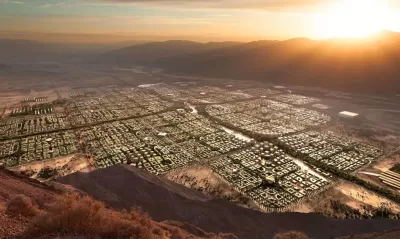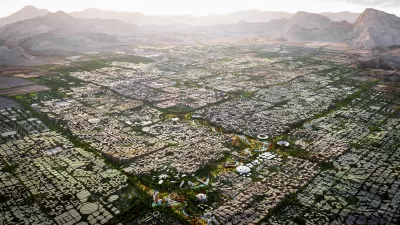Like others before him, e-commerce billionaire Marc Lore wants to build the ideal city from scratch. Urban experts don't have much faith in his chances.

Marc Lore, e-commerce founder and billionaire, has set his sights on planning a utopian community, reports Joshua Brustein. Inspired by the philosophy of 19th century economist Henry George, Lore has "come up with the modest proposal to start a private foundation, buy 200,000 acres or so of land, probably somewhere in the American West, and build a 5 million-person city from the ground up—a Georgist utopia that will serve as a demonstration project for a new, fairer phase of capitalism."
For Lore, the key would be the foundation's commitment "to take the appreciation of the land and give it back to the citizens in the form of medicine, education, affordable housing, social services." The model "mimics the way employees at startups are paid partially in stock. He says he’s planning the city much in the way he’d launch a business."
Lore is taking the project seriously: "[h]e’s hired a team that includes a transportation planner, an engineer, and an urban historian. His real estate consulting firm has narrowed the search for a site down to about six states and has even identified some specific 50,000-plus-acre parcels in Nevada—whose governor has proposed rules to encourage new cities—as potential sites." But despite his wealth, he doesn't have the funding, and he "hasn’t acquired land or water rights, precursors to undertaking the daunting task of persuading people to leave real cities for his hypothetical one," or "figured out how the foundation would operate or persuaded local officials to grant it the power it’d likely need to function."
Sarah Moser, associate professor of geography at Montreal’s McGill University, says the "tradition of trying to improve urban life by starting new cities from scratch" has a long, but largely unsuccessful history. Recent projects tend to have backing from the tech industry, whose "motivations vary from the desire to create test beds for technologies such as autonomous vehicles and citywide networks of sensors, to the Silicon Valley-esque conviction that privately owned startups are the solution to every problem." According to Alain Bertaud, former principal planner at the World Bank, brand new cities fall broadly into three categories: "libertarian attempts to escape government regulation; technocratic areas established to foster and showcase innovations; and projects seeking some novel model of collective welfare."
To Moser, projects like Lore's "are at best a distraction from the boring work of building functional cities—a particular shame at a time when places that already exist are struggling with the pandemic and the growing challenges of climate change. At worst, they end up being vehicles for private interests to extract concessions from local governments desperate for capital that could lead to economic development."
FULL STORY: The Diapers.com Guy Wants to Build a Utopian Megalopolis

Study: Maui’s Plan to Convert Vacation Rentals to Long-Term Housing Could Cause Nearly $1 Billion Economic Loss
The plan would reduce visitor accommodation by 25,% resulting in 1,900 jobs lost.

North Texas Transit Leaders Tout Benefits of TOD for Growing Region
At a summit focused on transit-oriented development, policymakers discussed how North Texas’ expanded light rail system can serve as a tool for economic growth.

Using Old Oil and Gas Wells for Green Energy Storage
Penn State researchers have found that repurposing abandoned oil and gas wells for geothermal-assisted compressed-air energy storage can boost efficiency, reduce environmental risks, and support clean energy and job transitions.

Santa Barbara Could Build Housing on County Land
County supervisors moved forward a proposal to build workforce housing on two county-owned parcels.

San Mateo Formally Opposes Freeway Project
The city council will send a letter to Caltrans urging the agency to reconsider a plan to expand the 101 through the city of San Mateo.

A Bronx Community Fights to Have its Voice Heard
After organizing and giving input for decades, the community around the Kingsbridge Armory might actually see it redeveloped — and they want to continue to have a say in how it goes.
Urban Design for Planners 1: Software Tools
This six-course series explores essential urban design concepts using open source software and equips planners with the tools they need to participate fully in the urban design process.
Planning for Universal Design
Learn the tools for implementing Universal Design in planning regulations.
Ascent Environmental
Borough of Carlisle
Institute for Housing and Urban Development Studies (IHS)
City of Grandview
Harvard GSD Executive Education
Toledo-Lucas County Plan Commissions
Salt Lake City
NYU Wagner Graduate School of Public Service





























